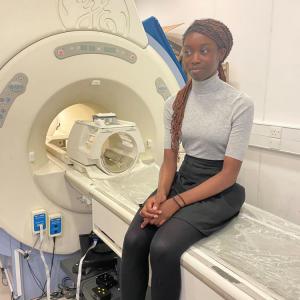You are here
Report from one of our IoPPN Youth Award recipients.
18 September, 2024

Silver, 17, got to spend two days with the Emergency Preparedness and Response HPRU at King’s College London as part of the IoPPN Youth Awards 2024. Here are her reflections on the experience.
Silver, tell us what you did at King’s?
I spent the past two days in multiple different areas and learning from a PhD student. I also had opportunities to speak to different people with different roles and this was really important to me as it allowed me to reaffirm my beliefs but also to see how research can involve many different parties depending on what is being found out. I have been exposed to the entire research process, allowing me to appreciate the significance of it. Over the two days, I was able to explore different sites of KCL. We visited the Brain Bank and saw three different types of brains including a fresh brain making me appreciate our body's defence mechanisms and also the importance of biology and learning about differential staining. We saw a wooden MRI machine and had the opportunity to sit in on a seminar on developing an online help service that introduced me to PPI [Patient and Public Participation] and also showed me how useful it truly can be.
Tell us a bit more about PPI?
Patient and Public Involvement (PPI) is when the public and your target population engages with the research process and lets their opinions and ideas be known to allow them to influence the outcome so it can benefit them. PPI ensures that research is relevant to the needs and experiences of the people it aims to benefit. It is important as it ensures that research outcomes are relevant and meaningful to the target population. This also puts an emphasis on inclusivity and community engagement allowing people to feel more involved. By involving the target population and the public in the research process, studies become more relevant and produce more significant results.
How did you get involved in what the research the unit is doing?
We worked on analysing interviews of teenagers to understand their attitudes and beliefs towards vaccination then did some thematic analysis to come up with a study and a solution to improve the rates in which teenagers take vaccines. I found it incredibly fulfilling to contribute to research that has the potential to inform public health interventions.
What kind of things have you learned?
I learned how data is collected and then made into a research paper and the amount of resources, time and inference it takes to do this. The most surprising thing was knowing how much collaboration goes on in research and how much data collection is needed for one. In addition to understanding the data collection process, I gained insight into the various methods used to do this effectively.
What would you say to people thinking about applying for the IoPPN Youth Awards or getting involved in PPI in the future?
I would recommend it. It's an amazing experience that allows you to learn about the body and allows students to learn more about public health research and make meaningful contributions. I am truly grateful for the knowledge and skills I have acquired. I also confirmed the fact that I do strongly believe this is a vital area of research that works to assess the outcomes and impacts of real life-changing events. I believe that anyone who applies for this will be impacted and want to learn more. Overall, my experience at the King’s College London NIHR Health Protection Research Unit in Emergency Preparedness and Response has been truly eye-opening and enriching.




